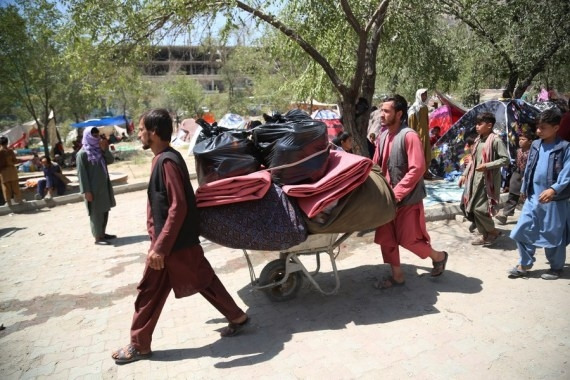The Afghan women have pulled out their burqas. The men have stopped shaving their faces. People are withdrawing their money. The poor are lining up on borders that Pakistan has closed while the rich are queuing up at the Kabul airport to catch that last flight to safety.
The embassies have flown out their staff double fast. Powerful warlords have fled to neighbouring countries as have many Afghan soldiers. The fleeing Kabul residents have formed queques at visa centres that run into kilometres. The roads leading outside of Kabul city are choked with cars.
As Afghanistan garners international attention, a humanitarian tragedy, entirely man-made, unfolds by the hour. The tragedy, wreaked by the militants is now consuming the cities and urban centres of Afghanistan. The rural areas were anyway largely under the sway of the Taliban, militants of various hues and warlords.
The Taliban's tales of brutality matched their swift advance into Kabul. Women are particularly scared and vulnerable. So are those Afghans who worked for the government, the military and with foreign powers. The Taliban has also indulged in targeted killings of civil society members, journalists and human rights advocates
Ordinary Afghans show no faith in the Taliban and entire families have fled their homes.
On Friday, United Nations Secretary-General Antonio Guterres told the media: "I'm… deeply disturbed by early indications that the Taliban are imposing severe restrictions on human rights in the areas under their control, particularly targeting women and journalists. It is particularly horrifying and heartbreaking to see reports of the hard won rights of Afghan girls and women being ripped away", he said.
In a separate news report, the Office of the United Nations High Commissioner for Refugees (UNHCR) said over the weekend that nearly 400,000 people have been displaced by the rising conflict in the country. Many of these people had fled to Kabul before the Taliban reached there.
UNHCR spokesperson Shabia Mantoo said that Afghanistan is likely to witness the highest-ever number of civilian casualties in a single year. The displaced people, who are battling hunger, disease, coronavirus and poor sanitary conditions, are moving toward the Iran and Pakistan borders.
The UN has been repeatedly appealing to Afghanistan's neighbouring countries to keep their borders open as fighting has been reported from 33 of Afghanistan’s 34 provinces. Pakistan had, however, clearly said that it will not take anymore Afghan refugees as an influx could precipitate its Covid-19 situation. It has kept its borders closed even as ordinary Afghans continue to reach the borders.
The UN agency says about 80 per cent of the displaced people are women and children.
Though the Taliban spokesperson has been emphasising that the militants have shed their orthodox approach, the reality on the ground has been proven otherwise. The Taliban militants are known to deny rights to women and girls, have closed down girls' schools and are resorting to stoning, hanging and killing people for not following Islamic dictats.




















